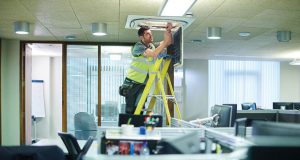 Current rates of retrofit recruitment must triple if the country is to meet its 2050 net zero target. But we can’t have a retrofit revolution without closing the green skills gap, says Tom Hoines, Director of Reed Environment
Current rates of retrofit recruitment must triple if the country is to meet its 2050 net zero target. But we can’t have a retrofit revolution without closing the green skills gap, says Tom Hoines, Director of Reed Environment
The race to achieve net zero by 2050 is on, and it will be a huge challenge for the country. But it is one that we cannot afford to fail and risk missing out on the economic opportunity that it provides.
Decarbonising buildings is a vital part of the wider net zero plan. While the focus has often been on shiny new technology, making our existing buildings more efficient and sustainable is crucial if we’re to hit our net zero targets on time.
The government already has specific targets in place to reduce the energy consumption of buildings and industry by 15 per cent against 2021 levels by 2030 and to reduce heat demand by 25 per cent by 2035.
However, this reduction cannot be met with new buildings alone – upwards of 80 per cent of existing buildings will still be in use in 2050 – so, a retrofit revolution is required to meet these targets. To achieve this, the UK will need to upskill its workforce in green skills and energy efficiency.
REED ENVIRONMENT
That’s why we have launched Reed Environment. Reed Environment is part of Reed in Partnership, a company with 25 years’ experience of delivering high-quality public services that improve people’s lives. Through our employability programmes, we have supported over 250,000 people back into work across the country. We are also part of the Reed Group, the world’s largest family-owned recruitment company.
We want to use that knowledge and experience to close the green skills gap.
Without addressing the green skills shortage, net zero will not be achieved. The numbers are stark, with significant shortages of retrofit assessors and coordinators, heat pump installers and other skilled tradespeople. If the country has any hope of meeting its climate targets, around 400,000 more people will need to work in the net zero space by 2030, and retrofit recruitment needs to triple.
We have made an investment in the Oxford Energy Academy, a highly-rated OFSTED training provider based in Witney, Oxfordshire. Our investment will build on OEA’s track-record of delivering high quality gas, electrical and plumbing training to add two new courses to their programme:
- Domestic Energy Assessor: This qualification equips learners with the ability to carry out Energy Performance Certificate assessments to rate the efficiency of a domestic property.
- Retrofit Assessor: Retrofit Assessors undertake an assessment of a building looking to make energy efficient and cost-effective improvements. Incorporating RdSAP data collection, a condition survey and an occupancy assessment, the assessor will gather a variety of information, including but not limited to, the identification of the installed building services, an appraisal of the dwelling’s heritage and an identification of any constraints imposed by the local planning authority.
Courses will cost between £1,200 and £1,500, with salaries for retrofit coordinators sitting at around £30-£40k a year. With flexible working, these jobs offer a huge amount to would-be applicants.
ADDRESSING RETROFITTING DEMAND
We have plans to expand by opening two more academies by 2025 in areas of the country where demand for these skills is high. At full capacity, we will add 1,000 new retrofitters to the market each year – and we won’t stop there. We plan to widen our offer of green skills training, including new retrofit courses, as well as solar, electric vehicles and heat pump installation.
Closing the green skills gap offers huge economic opportunities in every part of the UK. It will create well-paid, highly skilled jobs that benefit individuals, their families and their communities. We will tap into our networks to connect newly trained workers to job opportunities with local authorities, housing associations, and private landlords.
We are proud to play our part but we cannot do it alone. We need better, targeted policies from government that are clearly designed to increase demand for retrofit and other green technology while supporting the development of skills training that will be required to deliver it. This is an investment in the country’s future, and one that will spread opportunity equally.
Private landlords and local authorities also have skin in the game and will need to be at the forefront of driving demand for retrofitting at scale as they upgrade aging dwellings and build new developments. For all those responsible for building management, now is the time to make the case for investment in retrofit which will make buildings more sustainable and cheaper to run.
The time to embrace retrofit is now, and we look forward to working with government, businesses and individuals to supercharge this green skills revolution.





